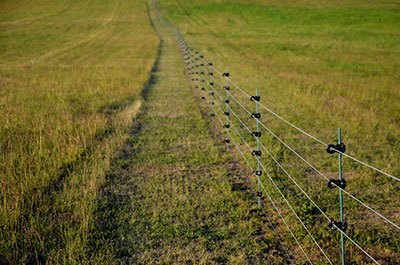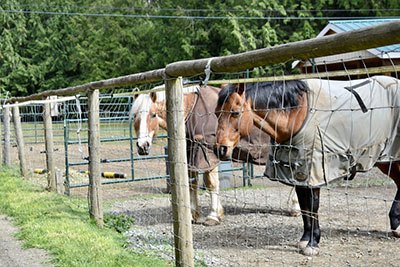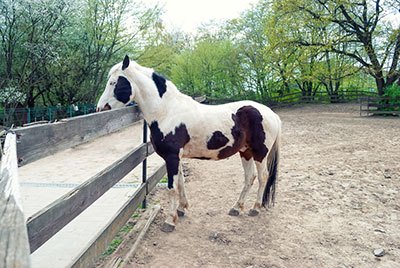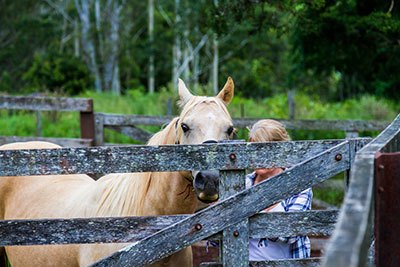Whether you’re a horse enthusiast or have an agricultural business, finding the right fencing solution is key to making sure your horses are safe and comfortable. With so many materials and styles available, it can be difficult to know which one best suits your needs.
In this blog post, we’ll explore the different horse fencing options available today—including wood rails, electric fencing systems, and more—to help you make an informed decision when shopping for the perfect fence for your horses!
Take away key points:
- Electric fence wire is common fencing for horses, however you should never use high voltage for horse pastures.
- Barbed wire, low-quality PVC fencing, and pipe fencing are the least common types of horse fencing. Options such as barbed wire and smooth wire fences risk the safety of your horse farm.
- Wooden fencing is a strong and reliable option for fencing for horses. It does not risk safety, and with proper construction, it can bring you peace of mind.
Table of Contents
How to choose the best gate posts for horse fencing
1. Size
The size of your gate posts will depend on the size of your gate. A larger gate will require larger posts to support its weight.
Generally, gate posts should be at least 5 inches in diameter, with larger gates requiring posts up to 8 inches in diameter.
2. Installation method

Gate posts can be installed using a variety of methods, including burying them in the ground, attaching them to an existing concrete slab, or mounting them on a concrete footing.
Each method has its own advantages and disadvantages, so you’ll need to consider factors like soil type, climate, and cost when deciding which installation method to use.
3. Maintenance
Finally, consider the maintenance requirements of your gate posts. Some materials, like wooden posts, require regular maintenance to prevent rotting and decay. If you plan on using wood posts, secure them with concrete!
Other materials, like PVC and metal, require less maintenance but may not be as durable in the long run. Choose a material that fits your maintenance preferences and budget.
4. Visibility
Visibility is an important aspect of horse fencing, as it allows horses to see the boundaries of their enclosure and avoid running into the fence.
The type of fencing material and its height can affect visibility for your horses. For example, a solid wood fence may limit visibility, while a rail or mesh fencing can provide greater visibility.
Additionally, selecting a color that is highly visible to your horses (such as white or bright colors) can improve their ability to see the fence.
Top 7 horse fencing options
1. Wood fencing
Wood fencing is a classic and reliable choice for containing horses within designated areas. Not only does it provide a sturdy barrier, but it also adds a touch of rustic charm and natural beauty to any property.
One of the main benefits of a wood fence is its strength and durability. When properly maintained, it can withstand years of exposure to weather, wind, and even animal impact. This makes it a great investment for anyone looking for a long-lasting fencing solution.
While wood fencing comes with many benefits, there are some disadvantages to consider as well.
Firstly, wood fences requires regular maintenance to ensure its durability. This includes regular cleaning, painting or staining, and repairs as needed. Neglecting maintenance can lead to decay and rot, which can compromise the integrity of the fence.
Additionally, wood board fence is not as sturdy as some other materials, such as PVC or metal fencing. In some instances, horses may be able to break through or damage the fence, which can pose potential risks of injury to both the horse and rider.
Also, wood fencing can often be expensive, depending on the wood prices.
2. PVC/Vinyl horse fencing
This type of fencing has many benefits that make it a reliable and low-maintenance solution for properties that house horses.
One of the main advantages of PVC fencing is that it is extremely durable and long-lasting.
This material can withstand extreme weather conditions, such as wind, rain, and snow, without weakening or rotting like traditional wooden fences. This durability also makes it an ideal choice for areas with high traffic or where horses tend to lean or rub against the horse fence.
PVC fence is also very versatile and can be customized to fit any style, color, or design requirements. Additionally, vinyl and PVC fence is known for offering privacy to the horses and keeping them separated from other animals or people on the property.
In terms of safety, PVC/vinyl fencing is a great option as it does not splinter or crack and therefore does not pose any risks of injury to horses. It is also resistant to pests like termites and fungi, making it a safer option for horses that come into contact with the fence.
3. Electric fence

Electric fencing is an effective and affordable fencing option for those looking to contain horses within designated areas. This type of electric fences utilizes electric currents to create a psychological barrier that dissuades horses from approaching or attempting to breach the fencing.
One of the main benefits of an electric fence is its affordability and ease of installation. Electric fencing is composed of simple materials like posts, insulators, and wires, which makes it an inexpensive choice compared to other fencing materials.
However, it is important to note that electric fencing also comes with some disadvantages. Electric fences can be less visible, and horses may not be aware that they are approaching a barrier. Poorly maintained electric fence lines can lead to accidents that can harm horses and other animals on the property.
4. Mesh wire fencing
Mesh wire fencing is a cost-effective and durable fencing solution suitable for containing horses with minimal maintenance.
The tightly woven wire fencing provide a sturdy barrier while ensuring the safety of the animals by preventing entanglement. It can be customized to match different styles( square mesh & v-mesh wire), and the fence posts can be made of metal or wood.
However, it is important to note that mesh wire fencing also has some disadvantages. In areas with high winds, the mesh wire fence can sometimes sag, leading to substantial maintenance requirements. Additionally, since the mesh is not solid, it does not provide the same level of privacy as other fencing materials.
5. Pipe and cable horse fencing
Pipe and cable horse fencing, also known as rail horse fencing, is a popular choice among most horse owners due to its strong and durable design. This type of fencing consists of horizontal rails, usually made of metal pipe fencing or wood, and cables running between the posts, providing a barrier for containing horses.
In addition to its practical benefits, pipe and cable horse fencing can also be visually appealing, adding a rustic charm and classic look to any property. It can be customized to fit the specific style and preferences of the owner, and its design makes it suitable for both large and small properties.
However, it’s important to note that pipe fencing, PVC board fencing, and cable horse fencing can be more expensive fences than other types of horse fencing. In addition, it may not be the best option for those looking for a high level of privacy as the rails and cables are spaced apart.
6. Steel horse fencing
Steel horse fencing, also known as metal horse fencing, is a durable and sturdy option for containing horses. This type of fencing consists of steel posts and rails that provide a strong barrier for horses, with welded wire fencing mesh or woven wire attached to it.
One of the main benefits of steel horse fence is its strength. It is one of the most durable and long-lasting fencing materials available, withstanding impacts and exposure to harsh weather conditions. Steel horse fencing is also fire-resistant and less prone to damage from pests like termites.
However, steel horse fencing can be expensive compared to other fencing options like PVC/vinyl or split-rail fencing. It also offers less aesthetic appeal than wood or mesh horse fencing, although it can be painted or coated in a variety of colors.
7. High-tensile polymer horse fencing
High-tensile polymer horse fencing is a newer type of fencing that provides a strong, flexible, and cost-effective solution for containing horses. Composed of high-performance polymer material and tensioned steel wires, this type of fencing is designed to withstand extreme weather conditions and wear and tear over time.
The polymer coating over the steel wires provides a barrier that horses are unlikely to lean, chew, or push through. Additionally, the tensioned steel wires provide a flexible barrier that can absorb impacts from horses, reducing potential injuries.
High-tensile polymer horse fence requires professional installation for wire tensioning and post positioning. Since it doesn’t provide a solid barrier like other horse fence materials, it may not be the ideal choice for privacy
What is the best fencing for miniature horses?
When it comes to fencing for miniature horses, safety should be the top priority. One of the best options for fencing is a four-board wooden fence or a vinyl fence. Both of these options are sturdy and provide a secure enclosure for miniature horses.
They are also highly visible, which can help to prevent accidents. Another option is using electric tape fencing, which offers flexibility and visibility. It is important to ensure that the fence is at least 4 feet tall to prevent the horses from jumping over it, and that there are no gaps or loose boards that could cause injury.
Horse fencing installation and maintenance tips

Installing horse fencing can seem like a daunting task, but there are some tips you can follow to make the process go smoother. Here are some installation tips for horse fencing:
– Measure the area where you want to install the fence. This will help you estimate the amount of material required for the fence.
– Consider the terrain of the area, including any slopes, uneven ground, or obstacles. This will impact the type of fence you choose and how it’s installed.
– Follow the manufacturer’s instructions on how to install the fence. Different fencing types require different installation processes, such as proper post placement, wire tensioning, and bracing.
– Make sure the fence is installed at the right height to prevent horses from jumping over it. The fence should be high enough to prevent the horse from clearing it in its entirety.
– Regular maintenance of the pasture fences is essential to ensure its longevity and effectiveness. This includes regular inspections, replacing any damaged posts or rails, and keeping vegetation grown around the fence trimmed.
– If using electric horse fencing, ensure that it is correctly grounded and that the charger is working correctly. Regularly check the voltage to ensure that it’s working correctly.
– Always prioritize safety when installing and maintaining your horse fence. Regularly check the fence for any damage or disrepair that could put horses at risk of injury.
FAQs
What is the cheapest type of horse fencing?
The cheapest type of horse fencing is typically a wire mesh fence. Wire mesh fencing is relatively inexpensive and easy to install. It can be combined with wooden or metal fence posts and railings to create a sturdy and effective fence.
What kind of fencing is not recommended for horses?
Barbed wire fences, smooth wire fence, mesh fencing with large fence openings, electric fencing with high voltage, and PVC fences or rails are not recommended for owning horses due to safety concerns.
What is the best fence for a horse paddock?
The best fence for a horse paddock is typically a three- or four-rail wooden fence or a vinyl fence. These options are sturdy, highly visible, and can provide excellent security and containment.
Is wire fencing safe for horses?

Wire fencing can be used for horses under certain conditions, but generally, it is not as safe or effective as other fencing options. The main problem with wire fencing is that it can cause serious injuries if a horse gets tangled in it.
Barbed wire fences can easily harm the panicked horse if the horse runs away or tries to jump over the physical barrier property lines.
How much does horse fencing cost per foot?
The cost of horse fencing per foot varies depending on the type of fencing material, the height of the fence, and the overall length of the fence.
On average, wooden rail fence costs $8 to $12 per foot, vinyl fence costs $15 to $30 per foot, electric tape fence costs $1 to $2 per foot, split rail fence costs $10 to $20 per foot, and high-tensile wire fence costs $1 to $2 per foot.
Why do horse farms have double fencing?
Horse farms often have double fencing for two main reasons: to prevent horses from escaping and prevent unwanted animals or people from entering the pasture.
What is the best wood for horse fencing?
The best wood for horse fencing is a hardwood that is strong, durable, and resistant to rot and decay. Oak, redwood, cedar, and locust are some of the top choices for horse fencing. The best choice will depend on location, climate, and personal preference.
Final words
When it comes to choosing a fencing option for horses, it is important to prioritize safety, durability, and effectiveness.
While each fencing option has its own benefits and drawbacks, it is important to choose a type of fence that is appropriate for your specific situation, whether you have a small paddock for a few horses or a large grazing pasture for many animals.
By selecting the right type of fencing and ensuring that it is properly installed and maintained, you can create a safe and secure environment for your horses to roam and graze.
